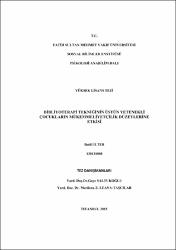Bibliyoterapi Tekniğinin Üstün Yetenekli Çocukların Mükemmelliyetçilik Düzeylerine Etkisi
Künye
İLTER, Betül, Bibliyoterapi Tekniğinin Üstün Yetenekli Çocukların Mükemmelliyetçilik Düzeylerine Etkisi, Fatih Sultan Mehmet Vakıf Üniversitesi Sosyal Bilimler Enstitüsü Psikoloji Anabilim Dalı, Yayımlanmamış Yüksek Lisans Tezi, İstanbul 2015Özet
Bu araştırmanın amacı, bibliyoterapi tekniğinin üstün yetenekli çocukların
mükemmeliyetçilik düzeylerine etkisini araştırmaktır. Araştırma 2014-2015 eğitimöğretim
yılında, Enderun Çocuk Üniversitesi’nde eğitim gören, 64 üstün yetenekli 3
ve 4. sınıf öğrencisi arasından seçilen 14 kişi ile yürütülmüştür.
Araştırmada veri toplama aracı olarak, Özbay ve Mısırlı-Taşdemir (2003)
tarafından Türkçe’ye uyarlanan Çok Boyutlu Mükemmeliyetçilik Ölçeği (ÇBMÖ) ve
Ünal (2006) tarafından geliştirilen Okumaya İlişkin Tutum Ölçeği kullanılmıştır.
Araştırmada 2x2’lik karışık desen (deney – kontrol – ön test – son test) kullanılmıştır.
Araştırmanın bağımlı değişkenini öğrencilerin mükemmeliyetçilik düzeyleri
oluştururken, bağımsız değişkenini ise bibliyoterapi temelli eğitim programı oluşturmaktadır.
Uygulamanın başlangıcında ÇBMÖ 64 öğrenciye uygulanmıştır. Ölçekten
grup ortalamasının üzerinde puan alan öğrenciler içinden 14 kişi yansız olarak
seçilmiş olup; bunlar içinden de Okumaya İlişkin Tutum Ölçeği’nden yüksek puan
almış olan 7 kişi deney grubuna, puanı yüksek olmayan 7 kişi ise kontrol grubuna
atanmıştır. Oluşturulan gruplar arasında öntest bakımından fark olup olmadığı Mann
Whitney U testi ile kontrol edilmiştir. Araştırmacı tarafından geliştirilen ve 80-90
dakikalık 7 oturumdan oluşan bibliyoterapi temelli eğitim programı Enderun Çocuk
Üniversitesi’nin tahsis ettiği atölye sınıfında uygulanmıştır. Eğitim programının son
oturumunda ise ÇBMÖ tekrar uygulanmıştır.
Araştırmanın sonunda, programın öğrencilerin mükemmeliyetçilik düzeylerini
anlamlı bir şekilde azalttığı, bu azalmanın ÇBMÖ alt boyutlarından hatalara aşırı
ilgi, ailesel beklentiler, kişisel standartlar, davranışlardan şüphe, düzen boyutlarında
anlamlı bulunurken, azalmanın anlamlı olmadığı tek boyutun ailesel eleştiri boyutu
olduğu saptanmıştır. The aim of this research is to study the effect of the bibliotherapy technique
on the level of perfectionism in gifted children. The research was conducted with 14
out of the 64 gifted students who are 3rd and 4th grade at the Enderun Children’s University
(Enderun Çocuk Üniversitesi) within the school year of 2014 – 2015.
The Multidimensional Perfectionism Scale (Çok Boyutlu Mükemmeliyetçilik
Ölçeği - ÇBMÖ), adapted to Turkish by Özbay and Taşdemir (2003), and the Reading
AttitudesScale, developed by Ünal (2006), were used to collect data.
In the research, 2x2 mixed design (experiment – control – pretest – post-test)
was conducted. The perfectionism level of the students was chosen as the dependent
variable while the independent variable was the bibliotherapy-based educational program.
At the begining of the experiment, ÇBMÖ was administered to 64 gifted and
talented students and 14 students were selected randomly among those who scored
above average. Afterwards, 7 of the students – who also scored high on the Reading
Attitudes Scale – were assigned to the experimental group and the other 7 – with
lower scores on the Reading Attitudes Scale – to the control group. After the assignment,
Mann Whitney U Test was used to find out if there is a difference in the pretest
scores of these two groups. No difference was observed within experimental and
control group, as it was desired.
The bibliotherapy-based training programme, designed by the researcher herself
as a combination of seven sessions that last 80 to 90 minutes each, was executed at the workshop space provided by the Enderun Children’ University (Enderun
Çocuk Üniversitesi). MPS was conducted again at the last session.
Results show that the program had a significant decreasing effect on the students’
perfectionism levels. This reduction was found to be significant in the MPS
sub-dimensions of concern over mistakes, parental expectations, personal standards,
organization, doubts about actions while not significant only in parental criticism.



















